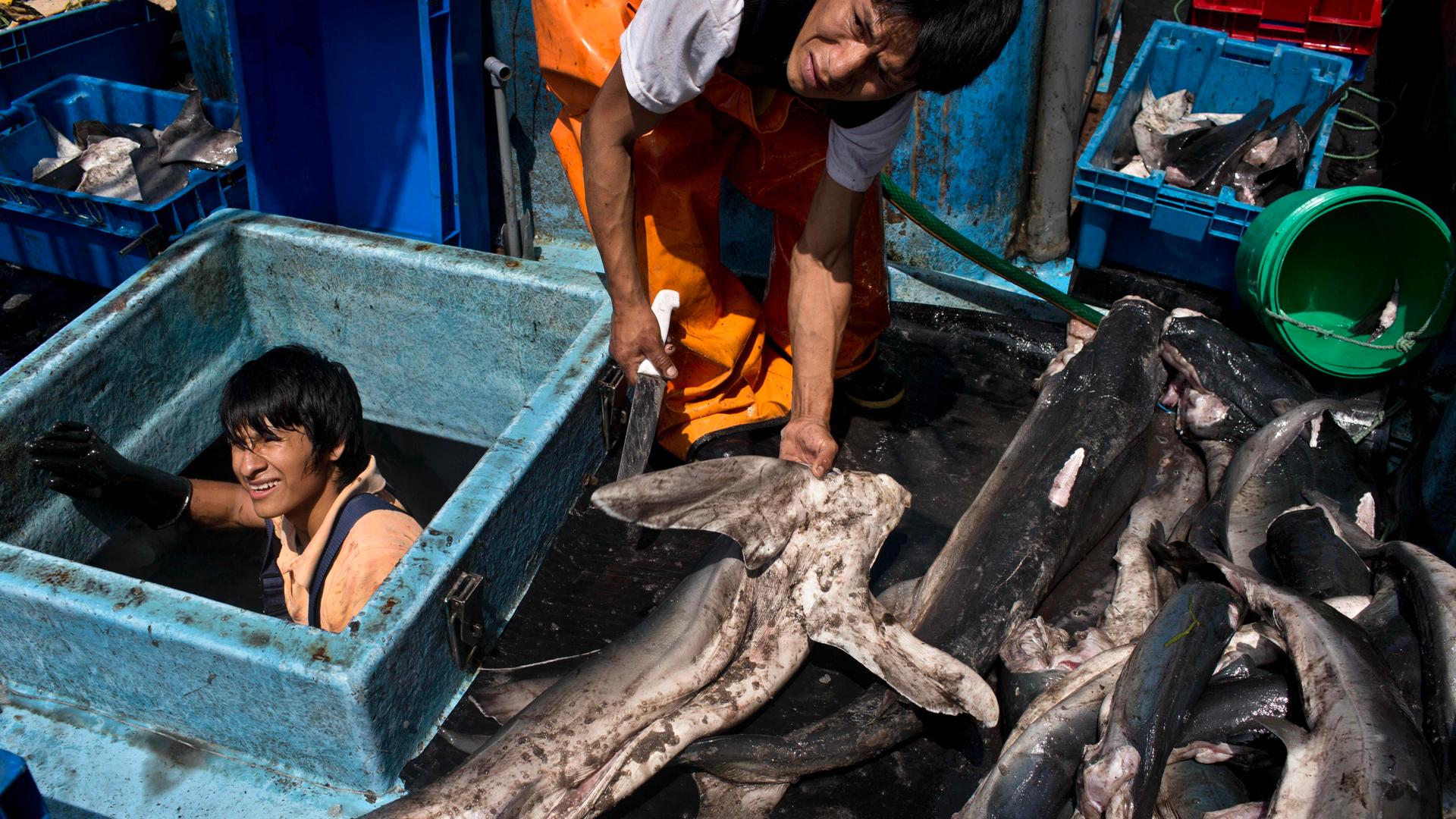For centuries, shark fin has been considered a delicacy in Chinese cooking — a symbol of hospitality, status and good fortune. The fin itself doesn’t have much taste, but it provides a gelatinous texture to a popular soup served at fancy banquets and luxury restaurants in China, where people pay up to $200 for a single bowl.
But there is a huge problem with this soup: Tens of millions of sharks are killed every year to make it. Many come from South America, where the shark fin trade has expanded and flourished.
Peru is the world’s largest exporter of shark fins, according to Oceana, an international organization devoted to ocean conservation. Around 95% of their shipments go to Hong Kong, where buying and eating shark fins is legal.
But most of these fins don’t come from Peruvian waters, explained Alicia Kuroíwa, a biologist and researcher with Oceana. “Around 75% of the sharks come from neighboring Ecuador, where there are far larger populations of sharks and fewer regulations,” she said.
César Ipenza, an environmental lawyer based in Peru, said there are criminal organizations that smuggle fins to Peru or hide them among frozen fish.
“Once there, there’s a system that allows for officials to issue illicit permits to ship them abroad,” Ipensa said.
Both Peru and Ecuador are grappling with corrupt officials, a lack of capacity and the large profits at play.
In Hong Kong, a pound of shark fins can cost up to $700, compared to $7 in Peru.
Selling shark fins in Hong Kong is legal, but people need a special permit to sell endangered species. People can face up to 10 years in prison for illegal trading, but prosecutions are rare.
Around the world, it’s not uncommon that shark hunters cut the fin off and throw the animal back into the sea. Unable to swim, they sink and die of blood loss or are eaten by other predators. This practice is known as finning, and it’s banned in many countries.
Finning doesn’t happen so much in Ecuador or Peru, Alicia Kuroíwa said, where sharks are caught and retained whole to satisfy a modest demand for shark meat.
But foreign ships may engage in finning and get away with it, according to Evan Ellis, a Latin American research professor with the US Army War College.
“You’ve seen Chinese-flagged vessels operating farther and farther off their coasts after they pretty much depleted fish stocks closer to [their] own shores,” Ellis said. “Their fishing fleets have had to go farther and farther away to find fishing stocks that have not been exhausted.”
Recent investigations show that hundreds of Chinese fishing vessels are operating almost 24/7 off the coast of South America.
Last year, China accounted for about 80% of the fishing in the international waters off Ecuador, Peru and Argentina.
According to Ellis, it’s challenging for authorities there to catch illegal foreign ships. “Oftentimes, vessels also will change names and registries that make it difficult for them to do so. And you have other practices such as turning off the transponder systems.”
Without advanced techniques, proving that a specific vessel has been engaged in illegal fishing is difficult.
The lucrative trade of fins is threatening species of sharks in South American waters, according to María Cristina Cely, a marine veterinarian and an environmental activist in Ecuador.
“Industrial fishing is depleting the overall fish population in Ecuador, which forces many local fishermen to look for exotic and more lucrative species like sharks or to go fishing in protected areas like the Galapagos islands.”
“Industrial fishing is depleting the overall fish population in Ecuador, which forces many local fishermen to look for exotic and more lucrative species like sharks or to go fishing in protected areas like the Galapagos islands,” Cely said.
The business is thriving across South America despite legislative efforts to stop it.
Last month, authorities in Panama seized its largest amount of illegal shark fins. And just a month earlier, Brazilian officials caught 29 tons — the world’s largest-ever shipment of illegal shark fins. Authorities estimate that close to 10,000 sharks were killed for this single shipment.
Panama’s Congress is currently discussing a bill that plans to restore and protect shark populations off its waters, but the country has still not banned shark fishing and the export of shark fins.
In Ecuador, people have been able to catch sharks by categorizing it as “incidental catch,” or an unintentional catch while fishing other species, which remains legal in the country.
However, in February 2022, Peru convicted two shark traffickers to four and a half years in prison for carrying 1.8 tons of fins from six species of shark, which they were going to sell to a seafood company. It took four years for the case to be completed, and there have been no convictions since.
Ipenza called it a “major success for Peru,” as this was the first time this country had ever sentenced anyone for illegal shark fin trading.
Related: An important fishing village in Senegal is on the verge of disappearing as sea levels rise
